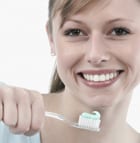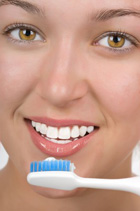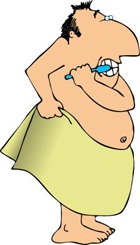 Brushing and flossing your teeth effectively and making sure you have a balanced diet are, of course, very important in ensuring lasting oral hygiene but you should combine this with regular visits to your dentist. Having your mouth checked by a professional is immensely helpful in making sure that your teeth and gums are healthy.
Brushing and flossing your teeth effectively and making sure you have a balanced diet are, of course, very important in ensuring lasting oral hygiene but you should combine this with regular visits to your dentist. Having your mouth checked by a professional is immensely helpful in making sure that your teeth and gums are healthy.
Even if you are extremely vigilant at home and are on the look out for signs of plaque build up, tooth decay and gum disease, you might miss something. This is where your dentist comes in. Get into the habit of visiting them every six months so that they can give your mouth a thorough check.
Using their expertise and specialist equipment, dentists can look at every corner of your mouth to determine the state of health of your teeth and gums. They will be on the look out for excessive plaque which can cause tooth decay and gum disease. They will also examine your gums themselves to see if you are developing gum disease, a common condition amongst British adults.
It is far better to spot any of these conditions early so that they can be dealt with effectively and without invasive procedures. What is most likely to happen at a dental visit is that your dentist will advise you on your home oral hygiene routine so that you can maximise your oral health through your own practices.
If you are anxious about seeing the dentist, rest assured that modern dentists take great pride in putting their patients at ease. Make an appointment today to see your Central Leeds dentist for a check up and avoid unnecessary complications with your oral health.





 Taking excellent care of your teeth involves avoiding such afflictions as tooth decay. This painful process can mean that you need to have a tooth removed or that it falls out. Needless to say, prevention is a better course of actions so that you don’t suffer the pain and indignity of losing a tooth and then having it replaced.
Taking excellent care of your teeth involves avoiding such afflictions as tooth decay. This painful process can mean that you need to have a tooth removed or that it falls out. Needless to say, prevention is a better course of actions so that you don’t suffer the pain and indignity of losing a tooth and then having it replaced. Maintaining your oral hygiene helps you to smile with confidence and avoid painful and unsightly conditions. To prevent a build-up of plaque bacteria, which can cause diseases in the mouth, a regular routine of brushing and flossing must be pursued. A healthy mouth means one that has teeth which are clean and free from debris, pink gums and an absence of bad breath.
Maintaining your oral hygiene helps you to smile with confidence and avoid painful and unsightly conditions. To prevent a build-up of plaque bacteria, which can cause diseases in the mouth, a regular routine of brushing and flossing must be pursued. A healthy mouth means one that has teeth which are clean and free from debris, pink gums and an absence of bad breath. Having a brilliant smile is an important part of feeling self-confident and assured. Tooth whitening procedures have long been available as a solution to those who have dull or stained teeth. Sometimes illness, lapses in oral hygiene or our diet and lifestyle can cause teeth to loose their natural whiteness or become stained. Even with correct brushing and flossing, teeth will loose their colour over time, just like our hair does. Enlighten represents a leap forward in home-applied tooth widening procedures.
Having a brilliant smile is an important part of feeling self-confident and assured. Tooth whitening procedures have long been available as a solution to those who have dull or stained teeth. Sometimes illness, lapses in oral hygiene or our diet and lifestyle can cause teeth to loose their natural whiteness or become stained. Even with correct brushing and flossing, teeth will loose their colour over time, just like our hair does. Enlighten represents a leap forward in home-applied tooth widening procedures. Maintaining your home oral hygiene routine is vital in maintaining healthy teeth and gums. Six month check ups with your dentist are very important, as is pursuing a balanced diet, but in the mean time it is crucial that you take good care of your teeth at home by brushing and flossing.
Maintaining your home oral hygiene routine is vital in maintaining healthy teeth and gums. Six month check ups with your dentist are very important, as is pursuing a balanced diet, but in the mean time it is crucial that you take good care of your teeth at home by brushing and flossing. Are you looking for a good dental practice in Leeds that can take care of your abscessed tooth? An abscess is a very painful thing to have and it happens if you neglect certain problems of your teeth and gums, leading to an infection. Your gum will have a painful swelling that is filled with fluid and which makes talking or eating very difficult. In addition to that, the treatment for this problem can be very lengthy and painful, as well as being costly.
Are you looking for a good dental practice in Leeds that can take care of your abscessed tooth? An abscess is a very painful thing to have and it happens if you neglect certain problems of your teeth and gums, leading to an infection. Your gum will have a painful swelling that is filled with fluid and which makes talking or eating very difficult. In addition to that, the treatment for this problem can be very lengthy and painful, as well as being costly. Bad Breath is the bane of everyone, whether it is in your work place or just socialising in the local hostelries, we need to be close to people when we chat and that’s when the problem starts. A Leeds dentist explains that bad breath is usually an Oral Hygiene problem that results from a lax regime. Bad breath can also be a sign of a liver disease or other problem; it is a symptom of a few diseases so always seek medical advice if the problem persists. A good oral hygiene program is the best way to avoid bad breath; it is caused by the production of by-products in the mouth by bacteria which feeds off the residue food left behind after a meal. Bad breath in the morning is due to a dry mouth in the night, as the saliva gland is also asleep when we are asleep. Just keeping a glass of water beside the bed will help the problem. In the morning floss first as this will get in between the teeth and remove hidden debris, brush and rinse to remove any leftover bits of bacteria. Tartar will build up on the teeth and eats away at the enamel, so removing bad bacteria debris is also important throughout the daytime, especially after we have eaten a sandwich or even a bar of chocolate. The fat and sugar residue that gets in between our teeth is the food that bacteria feeds off and makes acid out of, so washing it away by swigging water and flossing is very important.
Bad Breath is the bane of everyone, whether it is in your work place or just socialising in the local hostelries, we need to be close to people when we chat and that’s when the problem starts. A Leeds dentist explains that bad breath is usually an Oral Hygiene problem that results from a lax regime. Bad breath can also be a sign of a liver disease or other problem; it is a symptom of a few diseases so always seek medical advice if the problem persists. A good oral hygiene program is the best way to avoid bad breath; it is caused by the production of by-products in the mouth by bacteria which feeds off the residue food left behind after a meal. Bad breath in the morning is due to a dry mouth in the night, as the saliva gland is also asleep when we are asleep. Just keeping a glass of water beside the bed will help the problem. In the morning floss first as this will get in between the teeth and remove hidden debris, brush and rinse to remove any leftover bits of bacteria. Tartar will build up on the teeth and eats away at the enamel, so removing bad bacteria debris is also important throughout the daytime, especially after we have eaten a sandwich or even a bar of chocolate. The fat and sugar residue that gets in between our teeth is the food that bacteria feeds off and makes acid out of, so washing it away by swigging water and flossing is very important. Gum disease, also known as periodontal disease, is caused when bacteria build up to form a substance called plaque, which coats the gums and releases acids. These acids erode the gum tissue and begin to cause an irritation. If this problem is not treated or improved with more effective cleaning, it can soon develop into an infection and cause a variety of different dental health complications.
Gum disease, also known as periodontal disease, is caused when bacteria build up to form a substance called plaque, which coats the gums and releases acids. These acids erode the gum tissue and begin to cause an irritation. If this problem is not treated or improved with more effective cleaning, it can soon develop into an infection and cause a variety of different dental health complications. Oral cancer is a killer, but a preventative one. Cancer of the lips for instance is caused mainly by smoking and over exposure to the sun. Many of us tend to think of the sun giving us skin cancer, but it is emerging now that it also gives us oral cancer says a Leeds dentist. The symptoms of mouth, tongue and throat cancer are reddish lumps that are sore and often bleed. Once you find one get to your dentist or doctor straight away, ignoring it won`t make it go away. The cure rate is quite high, the treatments are not painful and your longevity will be increased, but only if you act quickly. Preventing oral cancer is all down to being sensible and taking precautions, your dental practice has a hygiene nurse to advise you, talking to them will enable you to make a sensible plan for keeping oral cancer from forming in your mouth. Being careful not to get too much sun ray exposure will also keep oral cancer away. Brushing the right way and flossing on a regular basis through the day is the best means to keep bad bacteria under control, and as this is the main cause of most oral and dental problems, it makes sense to have an oral hygiene format that is planned well. At night your saliva gland stops working, this will allow acid to build up and destroy the enamel on your teeth, by sipping water every time you wake up the acid will find it hard to do any serious damage. It is often the simplest of plans that work the best, so take the time to do a little research and plan your teeth cleaning regime well.
Oral cancer is a killer, but a preventative one. Cancer of the lips for instance is caused mainly by smoking and over exposure to the sun. Many of us tend to think of the sun giving us skin cancer, but it is emerging now that it also gives us oral cancer says a Leeds dentist. The symptoms of mouth, tongue and throat cancer are reddish lumps that are sore and often bleed. Once you find one get to your dentist or doctor straight away, ignoring it won`t make it go away. The cure rate is quite high, the treatments are not painful and your longevity will be increased, but only if you act quickly. Preventing oral cancer is all down to being sensible and taking precautions, your dental practice has a hygiene nurse to advise you, talking to them will enable you to make a sensible plan for keeping oral cancer from forming in your mouth. Being careful not to get too much sun ray exposure will also keep oral cancer away. Brushing the right way and flossing on a regular basis through the day is the best means to keep bad bacteria under control, and as this is the main cause of most oral and dental problems, it makes sense to have an oral hygiene format that is planned well. At night your saliva gland stops working, this will allow acid to build up and destroy the enamel on your teeth, by sipping water every time you wake up the acid will find it hard to do any serious damage. It is often the simplest of plans that work the best, so take the time to do a little research and plan your teeth cleaning regime well. Looking after the health of your teeth and gums is not just important for your mouth but could also make a difference to your overall health. With dental decay on the increase due to an increase in sugary diets and worsening standards of oral hygiene, and gum disease affecting nearly three quarters of all adults in the UK at some stage in their life, it is more important than ever to ensure a good standard of oral care.
Looking after the health of your teeth and gums is not just important for your mouth but could also make a difference to your overall health. With dental decay on the increase due to an increase in sugary diets and worsening standards of oral hygiene, and gum disease affecting nearly three quarters of all adults in the UK at some stage in their life, it is more important than ever to ensure a good standard of oral care.

